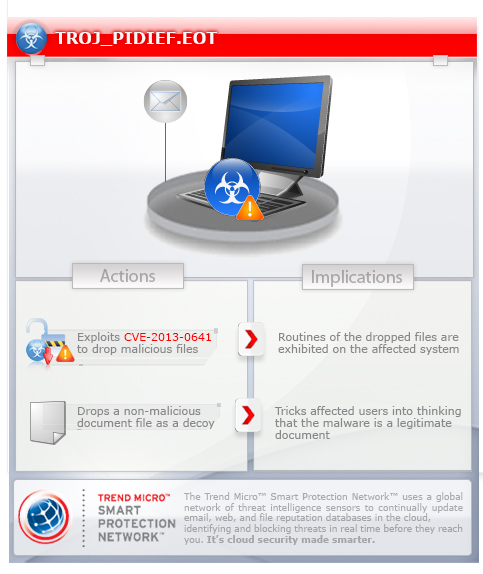TROJ_PIDIEF.EOT
Exploit:Win32/CVE-2013-0641 (Microsoft), Exploit.JS.Pdfka.giy (Kaspersky), Exploit.JS.Pdfka (Ikarus), PDF:Exploit.PDF-JS.VD (Bitdefender)
Windows 2000, Windows Server 2003, Windows XP (32-bit, 64-bit), Windows Vista (32-bit, 64-bit), Windows 7 (32-bit, 64-bit)


Threat Type: Trojan
Destructiveness: No
Encrypted: Yes
In the wild: Yes
OVERVIEW
This is a specially crafted PDF which takes advantage of a recent vulnerability in Adobe (CVE-2013-0641) to drop MiniDuke malware.
To get a one-glance comprehensive view of the behavior of this Trojan, refer to the Threat Diagram shown below.

This Trojan arrives as an attachment to email messages spammed by other malware/grayware or malicious users.
It executes the dropped file(s). As a result, malicious routines of the dropped files are exhibited on the affected system.
TECHNICAL DETAILS
Arrival Details
This Trojan arrives as an attachment to email messages spammed by other malware/grayware or malicious users.
Installation
This Trojan drops the following component file(s):
- %All User's Application Data%\{random}.{random}
- %All User's Application Data%\{user's existing folder}\{random}.{random}
- %Application Data%\{random}.tmp
- %Application Data%\update.cmd
- %User Temp%\acrord32_sbx\D.T
- %User Temp%\acrord32_sbx\L2P.T
(Note: %Application Data% is the current user's Application Data folder, which is usually C:\Documents and Settings\{user name}\Application Data on Windows 2000, XP, and Server 2003, or C:\Users\{user name}\AppData\Roaming on Windows Vista and 7.. %User Temp% is the current user's Temp folder, which is usually C:\Documents and Settings\{user name}\Local Settings\Temp on Windows 2000, XP, and Server 2003, or C:\Users\{user name}\AppData\Local\Temp on Windows Vista and 7.)
It drops the following non-malicious file:
- %Temporary Internet Files%\eu_advisory.pdf
(Note: %Temporary Internet Files% is the Temporary Internet Files folder, which is usually C:\Documents and Settings\{user name}\Local Settings\Temporary Internet Files on Windows 2000, XP, and Server 2003, or C:\Users\{user name}\AppData\Local\Microsoft\Windows\Temporary Internet Files on Windows Vista and 7.)
Dropping Routine
This Trojan takes advantage of the following software vulnerabilities to drop malicious files:
It executes the dropped file(s). As a result, malicious routines of the dropped files are exhibited on the affected system.
NOTES:
It opens the file eu_advisory.pdf to trick users into thinking that it is a normal .PDF file.
SOLUTION
Step 1
Before doing any scans, Windows XP, Windows Vista, and Windows 7 users must disable System Restore to allow full scanning of their computers.
Step 2
Restart in Safe Mode
Step 3
Search and delete these files
- %All User's Application Data%\{random}.{random}
- %All User's Application Data%\{user's existing folder}\{random}.{random}
- %Application Data%\{random}.tmp
- %Application Data%\update.cmd
- %User Temp%\acrord32_sbx\D.T
- %User Temp%\acrord32_sbx\L2P.T
- %Temporary Internet Files%\eu_advisory.pdf
Step 4
Restart in normal mode and scan your computer with your Trend Micro product for files detected as TROJ_PIDIEF.EOT. If the detected files have already been cleaned, deleted, or quarantined by your Trend Micro product, no further step is required. You may opt to simply delete the quarantined files. Please check this Knowledge Base page for more information.
Step 5
Download and apply these security patches Refrain from using these products until the appropriate patches have been installed. Trend Micro advises users to download critical patches upon release by vendors.
Did this description help? Tell us how we did.


